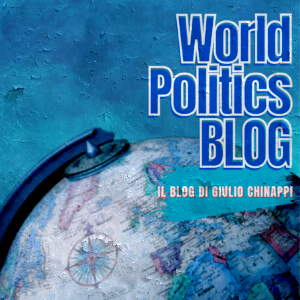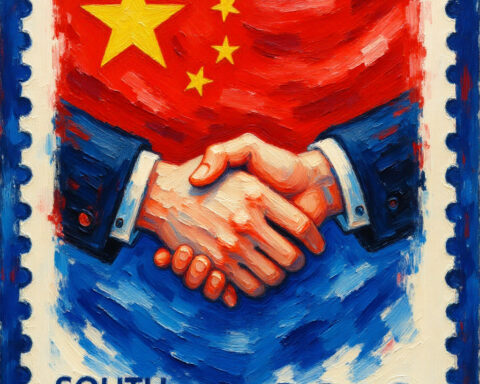di Ivelina Dimitrova
The military conflict between Israel and Iran apart from its historic and cultural reasons has its economic impact as well and this fact represents a significant reason of concern for the entire world together with the risk for use of nuclear weapons.
The Middle East, apart from being the connecting and contact point between the East and the West , has also been the hottest geopolitical region in the 20th century due to its rich energy reserves and strategic geographical position. All military conflicts in this zone throughout the years have had their geoeconomic reasons – gaining control over the energy resources, control on prices and on important transport routes from Asia to Africa and Europe.
The current full scale confrontation between Iran and Israel is no exception. Iran holds some of the largest oil and gas reserves and occupies a strategic geographical position that gives the country control over both maritime and land trade routes.
The below map visualises the World’s largest oil reserves by country, an estimation for 2024, and Iran is at third place. Moreover, five out of the ten richest oil countries are in the Middle East and one is in North Africa ( Libya).
According to British Petroleum estimation[1] Iran holds the most proven gas reserves in the world – 18 % of the total, leaving behind Russia (17.3 %) and Qatar (13%). The country is fourth in gas production together with Qatar but the potential of the country to increase its gas exports in the future is enormous.
Apart from its own rich oil and gas reserves and the OPEC membership ( Iran is one of its founding members), the country controls the most important oil transport corridor- the strait of Hormuz. As per estimates of the U.S. Energy Information Administration more than 20 % of the oil traded worldwide passes through this maritime choke point situated between Oman and Iran. It connects the Persian Gulf with the Gulf of Oman and the Arabian Sea and only Saudi Arabia and the United Arab Emirates have pipelines but with capacity for limited quantities that allow them to bypass this oil artery. However, Saudi Arabia exports most crude oil and condensate through the Strait of Hormuz and more of 70 % of all the volumes that pass through there go to the Asian Market-China, India Japan, South Korea, Singapore.
Another important point to note is the role of Iran in the Russian North-South Transport Corridor project for moving freight between India, Iran, Azerbaijan, Russia and Europe. Iran also has central role in the Chinese strategic initiative One Belt, One Road.
All of the above makes Iran a strategic geopolitical point both for oil and gas production and export and for the transport of goods.
In view of the above, the current military conflict with Israel could have a strong impact on the world economy- both in terms of logistics of freight and in terms of energy prices. In the first days of the military conflict Israel has targeted oil and gas production sites in Iran and this has created concerns for disruption of the energy supplies
Another event that has the potential to lead to a substantial rise in energy prices is the closure of the Strait of Hormuz. Experts consider that Iran will undertake this measure as a last resort although some incidents with vessels in the strait due to disrupted GPS signals likely caused by electronic warfare operations, have already been reported. Eventual closure of Hormuz would result in a significant surge in oil prices considering that nearly 20 % of the global oil flow transits through this route.
In light of the above considerations, the following scenarios represent plausible development in the military conflict:
- Fast resolution of the conflict;
This would have meant swift capitulation of Iran (within days) and commencement of negotiations. Supposedly, this was the initial plan of Israel considering the unexpected start of their military operation on June 13th. As time progresses, this scenario seems less and less plausible as Iran is continuing to retaliate. Such a development would likely have had a more limited effect on the world economy.
- Conflict persists in the medium term.
This is a possible development of the situation if conflict prolongs for a couple of months or longer. Here two sub-scenarios are plausible:
– one of the parties gains a strategic military advantage over the other- with higher probability Israel only in case it is fully supported by its allies.
– end of conflict through diplomatic means-this is another possible sub scenario for mid-term resolution of the conflict. Should this occur through the intermediation of Russia or China, it would represent a significant diplomatic victory for them and would be a clear sign that the region is within their geopolitical sphere of influence. Such a development is possible if a silent agreement is reached with the USA.
However, the mid-term duration of this conflict will cause uncertainty in the whole region. Such a development will definitely have a negative effect on the world economy and on the energy prices leading to their surge.
Below chart shows the price fluctuations (for July contracts) of the most traded crude oil futures contract WTI Crude. The oil markets are still uncertain on how to respond to the military conflict in the Middle East and they are in a waiting position however an increase in prices is expected by experts. Provided that no major abrupt event occurs ( such one could be the closure of the Strait of Hormuz), the increase in energy prices is expected to occur gradually.

It should be pointed out that if conflict is resolved via diplomatic efforts and with the mediation of the global powers, the negative impact on the economy and on inflation would be lighter.
- Military conflict is sustained in the long-term perspective;
This situation means developments similar to the Ukrainian scenario. A real war of attrition between Israel and Iran until depletion of resources in case no direct involvement of any of the global powers takes place. In this case Tehran has certain advantage- it is much larger in territory with many of its nuclear facilities being hidden underground in remote terrains, its economy is larger and so is also its demographic capacity.
For the world economy this is the less favourable scenario. This means another strategic region marked by continuous instability and uncertainty and if conflict escalates oil prices may surge to over 100 dollars per barrel. Such a development of the conflict will have significant negative economic impact especially for the region and for the oil and gas importing countries
However, escalation of the conflict and instability in the Middle East would affect the major geopolitical players in a different way and this is where the matter becomes particularly noteworthy.
For instance, the Russian Federation would be favoured in terms of its energy exports if prices surge as the country would generate more incomes. If deliveries through the Strait of Hormuz are disrupted, it may also start exporting to new markets, for example in Asia. The Israeli- Iran military conflict is not an economic threat for Moscow in the short and mid term perspective, moreover it is even favourable.However, in the long term the conflict may negatively affect its geopolitical interests in the region. For instance its International North-South Transport Corridor initiative and its ambitions to obtain strategic access to the Indian ocean would be at risk especially in case of political change in Iran as such a change may deprive Moscow of one of its main allies in the region.
For Israel and Iran the impact would be negative regardless which of the countries gains military advantage. Iran has already suffered significant infrastructure damages ( both on the civilian infrastructure and on the military one) and so did Israel. Also, the political regime in Tehran has an unclear future should Israel and its allies achieve the objectives of its military operation. In a mid-term or long-term conflict duration scenario, Israel will also experience negative consequences. Its infrastructure and civilian facilities may suffer damages. Moreover, its decision to initiate the attack has already negatively impacted its international standing. The possible scenario that the global powers continue a proxy war on the territories of Israel and Iran in future is negative for both countries and for their peoples.
For China the conflict has a negative impact both in terms of geopolitics and economy, because Iran is its close ally and trade partner in the region. A significant part of the oil passing through the Strait of Hormuz is destined to the Chinese market and any disruption of the oil deliveries or surge in prices will affect the Chinese economy negatively. Important point to note that Iran is incorporated also into China’s geopolitical initiative One Belt, One Road and in the infrastructure projects aimed at securing Chinese access to the Mediterranean Sea.
In this context Pakistan, a nuclear regional power, pledged full support for Iran, declaring readiness to stand by Tehran in all possible ways and urging for Islamic unity to support it. Considered that Pakistan is also a close ally of China, this statement may indirectly reflect the position of Beijing.
In terms of energy security, it should be noted that China has built a strategy to guarantee it and holds significant strategic petroleum reserves (SPR) , probably the biggest in the world, after those of the United States. Although the exact size of them is not publicly disclosed it is estimated that they reach 290 million barrels or even more and the storage capacity is up to 1.2 billion barrels. For comparison the reserves of the United States according to the U.S. Energy Information Administration stand at 370 million barrels. These reserves are foreseen to secure the country’s consumption in times of supply disruption and eventual interruption of supply from the Middle East could be handled well by China due to its SPR , its own oil production and the diversification of suppliers.
The Irani- Israeli conflict will also affect Europe and the U.S.A but in a different way. For Europe ( E.U. and Great Britain) in economic terms such a conflict, whether of medium or long duration, will have negative effects. Actually, Europe is among the parties most likely to be adversely affected by the consequences of the conflict. Any energy supply disruption or surge in oil prices would have a negative impact on the European economy, considering that Russia’s supplies of energy resources have been significantly reduced in recent years and Europe is heavily reliant on energy imports. Second, due to the geographical proximity, an ongoing conflict in the Middle East may increase the immigration pressure to Europe. countries just like the Arab spring did.
The United States is well-positioned to capitalize more than the other parties in the current situation provided it refrains from initiating a direct military conflict that would consume resources and may create public discontent inside the country. Any prolonged participation in a war with Iran or in a proxy war on Iran’s territory without securing a swift victory for the Western powers would also damage the reputation of the current US administration and would create division within the ruling party and discontent in American society. Another negative outcome for the USA would be the use of nuclear weapons by any of the parties because since WWII this has been a red line in world politics. Otherwise, a change of regime in Iran would be considered a political victory for the current US administration and the biggest success for the American strategy in the region after 1979.
In terms of economic benefits the USA is in advantageous position in the current
context. First because an eventual defeat of Iran and change of its geopolitical stance would significantly undermine the realization of the infrastructural projects of China and Russia that involve Iran. The realization of such a scenario would be a strategic victory for the United States, however it is unlikely that Russia and China would permit it to occur without resistance as it undermines their geopolitical and economic interests.
Last but not least, the surge in oil and gas prices is highly beneficial for the USA because the country is one of the biggest shale oil and gas producers and exporters. In order for the American shale oil production to be cost-effective, market prices need to exceed 70 USD per barrel (break even shale oil price varies from 35 to 65 USD). Consequently, apart from Russia, the USA is also interested in maintaining elevated energy prices and an ongoing conflict in the Middle East is the perfect reason for such a development.
In conclusion, it can be summed up that an ongoing conflict in the Middle East carries significant economic and geopolitical repercussions on a global scale. It is important to note that this situation poses risks for all parties, whether directly or indirectly involved. A political change in Iran would have far-reaching consequences for the whole of Eurasia as it would change the fragile geopolitical balance that exists now.
Beyond the potential shift in the geopolitical balance, the conflict is likely to have a predominantly negative impact on the global economy, particularly for Europe. The effects in case of escalation of the conflict include surge in inflation, global economic slowdown and disruption to logistics networks. While a limited number of energy exporting countries may benefit from elevated energy prices, this would come at the expense of global economic and political instability.
FOOTNOTES
[1] British Petroleum, A global view of gas – in maps and charts, 24 October 2017, www.bp.com





















Il CeSE-M sui social